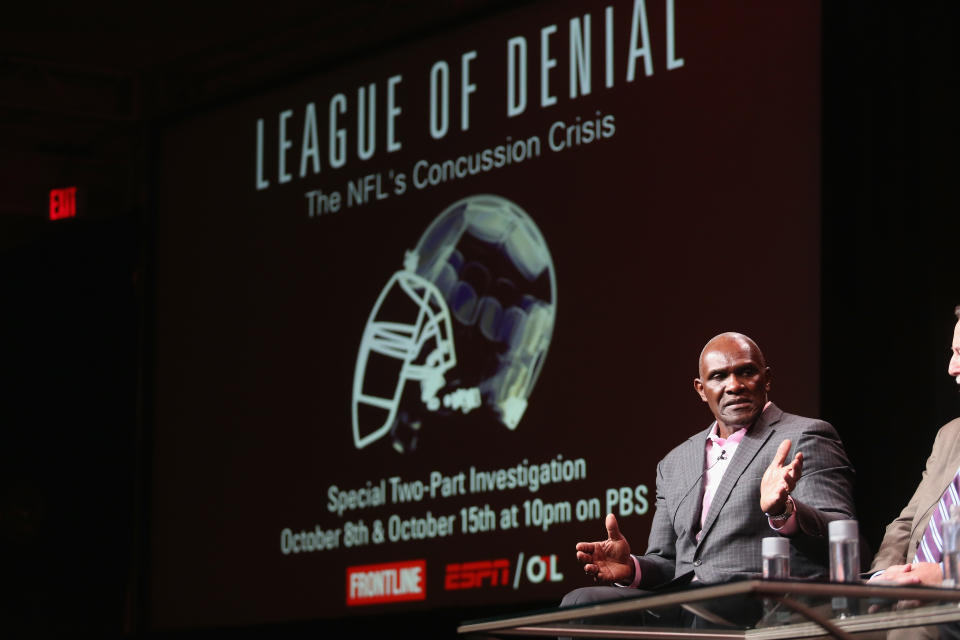ESPN kowtows to NFL: What’s the big surprise?
There's been quite a bit of fuss south of the border regarding the way the National Football League pressured ESPN to pull out of a documentary on concussions.
Some have called the network's decision to divorce itself from a partnership with PBS on a documentary exploring the league's sad history of concussions proof positive that broadcasters are in bed with the leagues they profess to cover and further evidence that ESPN is not the "worldwide leader" in sports journalism.
Well, with all respect to some of the excellent reporting done on this issue, I have to wonder what great revelation comes next. That athletes take steroids? That some people gamble on sports?
Not to defend ESPN or any of the other broadcasters who present sports as some kind of Disneyfied fantasyland, but this simply is the way that business is done. Broadcasters pay millions - in some cases, billions - for the right to earn millions (or billions) off sporting events. Biting the hand that feeds them is simply not good business.
That's why you'll hear networks call the leagues "partners." They're not like newspapers that pay no rights fees and have little fear of poking the bear.
Back in 1999, I broke a story for The Toronto Star on a new CBC "behind the scenes" documentary on the NHL. A New Ice Age: A Year in the Life of the NHL was a great series, showing all kinds of revealing things about the way business is done in the NHL. The league gave the documentary's makers unprecedented access to things such as contract negotiations and the like.
But there was a proviso: Unbeknownst to the media and viewers, the NHL had final say before it went to air. And the NHL spoke loudly, demanding the inclusion of video of Toronto Maple Leafs enforcer Tie Domi playing hockey instead of just fighting (can't have people thinking the NHL is all about violence, after all). It also demanded the addition of an interview with commissioner Gary Bettman to balance negative comments by Brett Hull.
The CBC wasn't happy about the changes, but it made them for two reasons: One, it was contractually obligated to do so. Two, it knew better than to aggravate its biggest meal ticket. Rile up the NHL and Hockey Night In Canada just might end up on CTV.
The TV landscape is littered with similar examples. In 2004, the NFL complained that ESPN's football drama series Playmakers cast the game in a bad light because it showed players engaging in things like sex and drugs. (At least there were no murders.)
ESPN cancelled the series before you could say Paul Tagliabue. The fact that ESPN was in negotiations on a new deal may have something to do with that decision.
While these kinds of things shouldn't be condoned, the fact is there's nothing unusual about them. A Canadian announcer once told me that he always had a good laugh when I knocked networks for failing to do in-depth reports on scandals involving the leagues whose games they carry.
"If we were to run a documentary that criticized the NBA, (commissioner) David Stern would be on the phone to our boss before the show ended and we'd be on the carpet that day," he said. For David Stern, slot in the name of any league commissioner.
It's not just fear of incurring the wrath of partners. If networks have paid millions for games, they don't really want to present stories that show the players or owners in a bad light. The way they look at it is, "How we do sell this to the public if we tell them those big hits we play up on the newscasts are actually destroying the players' brains?"
ESPN says that its decision to pull out of the PBS project had nothing to do with its contracts with the league.
“We had no editorial control and weren’t comfortable lending our branding to it," ESPN spokesman Josh Krulewitz said. "In hindsight we should have reached this conclusion much sooner, and that was a mistake on our part. Obviously, it’s a strange situation.”
Sadly, it's not strange at all. It's just the way of the broadcasting world.

 Yahoo Sports
Yahoo Sports 


